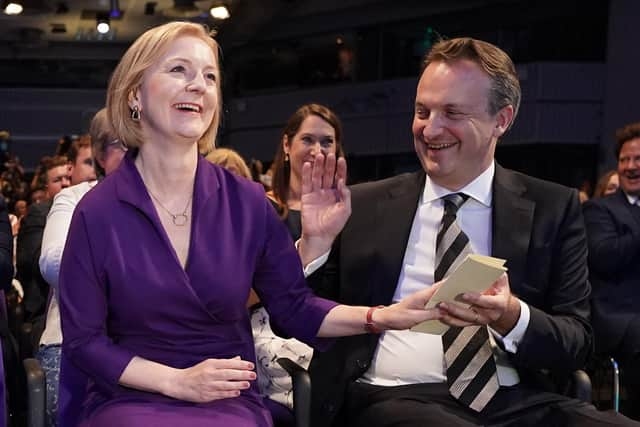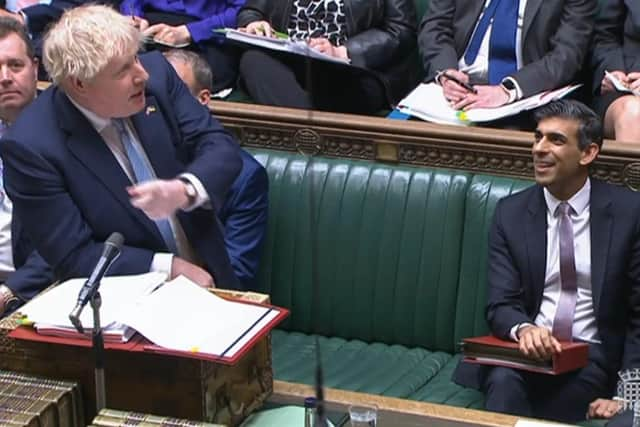Liz Truss wins Tory Leadership: Who is the UK Prime Minister? When is the next general election? How will Truss ease the cost of living crisis?
Today the Tory leadership contest results were announced, revealing that Liz Truss will be the new UK Prime Minister.
The result comes as little surprise to most after Truss maintained a huge lead over Rishi Sunak during the leadership race.
Advertisement
Hide AdAdvertisement
Hide AdHowever, the ‘honeymoon period’ is expected to be short-lived as a recession looms over Britain amid a burgeoning cost of living crisis, meaning the new PM must hit the ground running.


Despite promises of tax cuts, a detailed plan is yet to be unveiled for tackling the cost of living crisis.
Now, Britain is asking: who is Liz Truss, what happens next for our new PM, and how will the cost of living crisis be handled?
Who is the UK’s next prime minister, Liz Truss?
Britain’s new Prime Minister, Liz Truss, is the one-time Lib Dem turned Tory MP who rose to Foreign Secretary and is known for her right-wing political leaning and advocacy of Boris Johnson.


Similarly, she was also a ‘Remain’ advocate for EU membership in 2016 yet has since become a staunch supporter of Brexit.
The 47-year-old was born in Oxford and grew up with Labour-supporting parents (a nurse and a teacher) however she went to a Scottish primary school in Paisley and high school in Leeds, before studying Politics, Philosophy and Economics at Oxford where she became the president of the university’s Liberal Democrat group.
Previously, Truss was a Parliamentary Under Secretary in the education department, the Rural Affairs Secretary and then later the Justice Secretary and Chief Secretary of the Treasury.
How many votes did Liz Truss receive over Rishi Sunak?
On 5 September in Westminster, Sir Graham Brady announced that Liz Truss received 81,326 votes while Rishi Sunak received 60,339.
Advertisement
Hide AdAdvertisement
Hide AdThis means Liz Truss took 57.4% of the total ballot in order to win the Tory leadership race.
Unlike Boris Johnson who took 67.4% of the Conservative vote to defeat former rival Jeremy Hunt, Truss’ victory is not the ‘landslide’ win it was anticipated to be.
It has been suggested this could reflect division within the Conservative party.
What happens next?
Boris Johnson will now travel to Balmoral with Liz Truss on 6 September where he will formally tender his resignation to the Queen.
Johnson is expected to deliver a farewell speech outside Number 10 on Tuesday morning before this visit.
Due to mobility issues over the last year, the Queen will not be welcoming the new prime minister at Buckingham Palace despite the tradition.
Once Truss returns to London the new PM will work to appoint a new team including a foreign secretary, health secretary, home secretary and a chancellor.
It is understood that Truss has already devised this Cabinet but the ministers will need to accept their roles first.
Advertisement
Hide AdAdvertisement
Hide AdOn Wednesday morning, the new Prime Minister should then hold her first Cabinet meeting where they will likely address the cost of living crisis immediately.
Truss has stated she will unveil a plan to deal with the spiralling cost of living crisis within one week of entering office.
This, and more, should be revealed when Truss faces her first PMQs against Labour leader Sir Keir Starmer on the Wednesday afternoon.
How will Liz Truss ease the UK’s cost-of-living crisis?
Following a tumultuous summer that has seen a cost of living crisis featuring soaring energy bills amid a looming recession, Liz Truss is entering 10 Downing Street to find a daunting in-tray.
Truss has admitted that tackling the cost of living crisis is her number one priority once she takes office, in her words the recession is “not inevitable.”
However, the new Tory leader has thus far been tight-lipped on the details of her plan to reduce soaring energy bills yet has promised additional aid beyond the £37bn cost of living support recently announced by the Government.
It is expected that this may come in the form of using taxpayer money to fund a price cap freeze or for additional grants.
The 47-year-old has also promised a “bold” plan to bolster growth with cut taxes yet has explicitly ruled out saving money via cutting public spending.
Advertisement
Hide AdAdvertisement
Hide AdDetails of her energy plan, along with how the UK will rediscover energy security amidst the conflicts between Ukraine and Russia, are expected to be revealed this week.
When is the next general election?
The last general election took place on 12 December 2019.
UK Parliaments have maximum terms of five years from the day they first meet, therefore the current Parliament - which met on 17 December 2019 - will dissolve automatically on 17 December 2024.
The Polling day would then take place no later than Tuesday 24 January 2025, they are typically expected to be held 25 days later.
Britain’s next Prime Minister, Liz Truss, is facing pressure to call a general election by Christmas this year after an Ipsos poll, published by the Evening Standard, revealed that the majority of adults support a general election in 2022.
Comments
Want to join the conversation? Please or to comment on this article.
